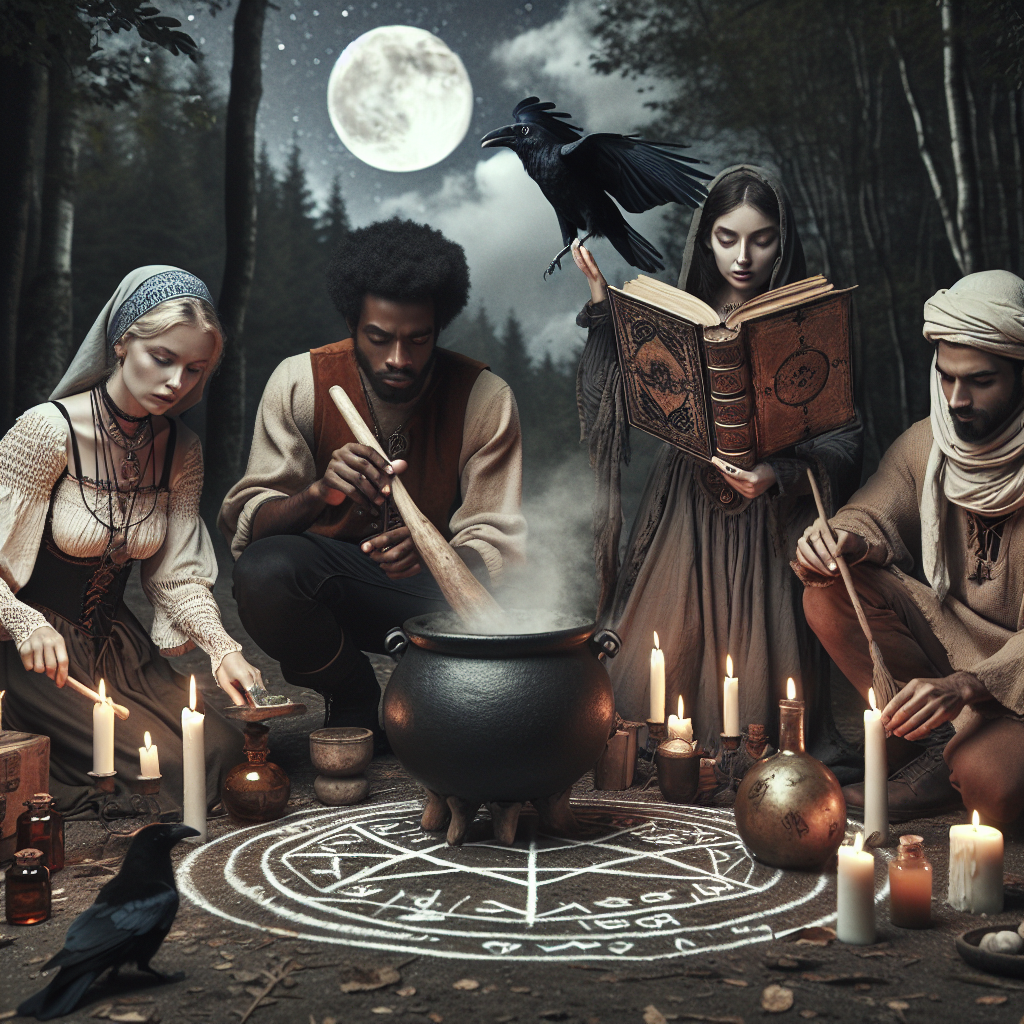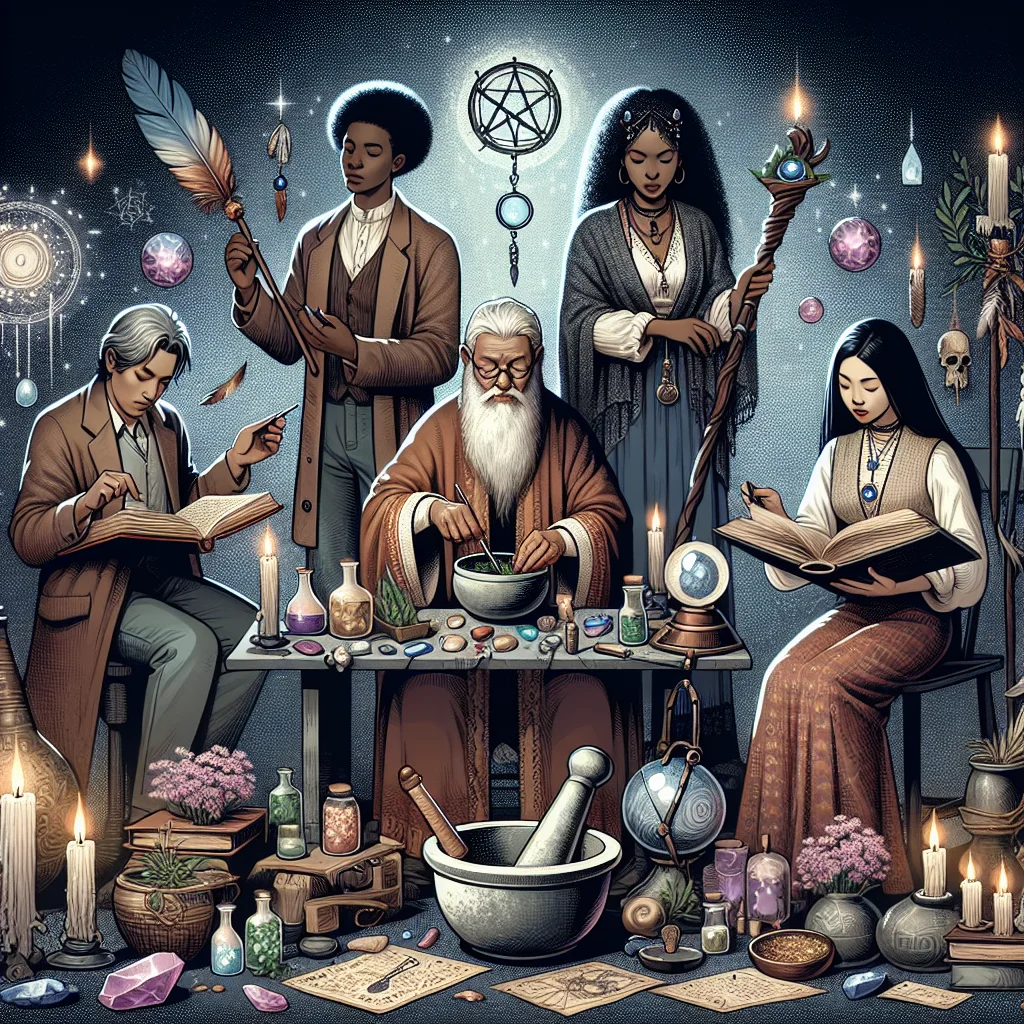As an Amazon Associate I earn from qualifying purchases.

Witchcraft, historically associated with the practice of magical skills, spiritualism, and sorcery, is a term that has evolved over centuries. From its infamous characterization during the European witch trials to its various representations in popular culture, the concept of witchcraft has consistently fascinated and terrified societies around the globe. Today, however, witchcraft has taken on new forms, often associated with pagan beliefs and practices, and is embraced by a diverse group of individuals seeking spirituality outside mainstream religions.
The practice of witchcraft today is remarkably eclectic, blending ancient traditions with contemporary philosophical and spiritual movements. Historically, witchcraft has been linked to the old religion of pre-Christian Europe, with paganism and Wicca being significant influences in its modern revival. Wicca, founded in the 1950s by Gerald Gardner, is one such tradition that has gained widespread attention, characterized by its respect for nature, observance of seasonal festivals, and use of magic. Not limited by geographical or cultural boundaries, modern witchcraft includes practitioners from all walks of life, with communities flourishing both in person and online.
Perhaps the most engaging element of modern witchcraft is its emphasis on personal experience and autonomy. This spiritual practice does not adhere to a strict dogma, allowing individuals to adapt beliefs and rituals to fit their personal needs and cosmologies. The DIY nature of witchcraft is thus fitting for an era that values personalization and self-expression. Compelling statistics suggest a surge in interest in alternative spirituality; for instance, a 2014 Pew Research Center survey found that 0.4% of Americans, approximately 1 to 1.5 million people, identify as Wicca or Pagan, highlighting a growing movement away from organized religion towards more individualized spiritual paths.
The public’s intrigue with witchcraft is also reflected in social media and pop culture, with a proliferation of books, television shows, and films epitomizing the practice in various lights. Social media platforms showcase “witch influencers” who share spell-casting techniques, tarot readings, and herbalist wisdom, reaching audiences in the millions. Such engagement demonstrates how witchcraft, while still sometimes misunderstood or sensationalized, has secured a place in contemporary spiritual discourse and culture.
Witchcraft’s resilience and adaptability suggest a practice deeply rooted in human experience, transcending specific cultural or temporal identifiers. Its practitioners, who may come from any number of religious or secular backgrounds, typically share a reverence for nature and a belief in the power of intention and ritual. Viewing witchcraft through the lens of contemporary spiritual practice allows for an appreciation of its dynamic place within the tapestry of global belief systems, where it continues to evolve and capture the human imagination.
`
Who Engages in Modern Witchcraft? Unveiling Contemporary Practitioners
`
Witchcraft in the modern era is a multifaceted phenomenon that defies a singular definition. It encompasses a diverse array of practices ranging from Wicca, a nature-oriented religion, to the varied traditions of pagan rites, and goes beyond to include individual eclectic spiritual systems. Those who practice witchcraft today—often referred to as Witches or Wiccans—may utilize rituals, spells, and ceremonies to manifest their intentions, seek personal growth, or connect with natural and supernatural elements. This cultural tapestry is not limited by geography; it thrives globally within both tightly-knit communities and solitary practitioners. In our comprehensive discussion, we will delve deeper into the profiles of these individuals, the philosophies that guide them, and the societal impact of their practices, painting a vibrant picture of contemporary witchcraft and its adherents.
Witchcraft is practiced by a diverse group of individuals across the globe, who often refer to themselves as witches. This group spans various cultures, ages, genders, religions, and walks of life. The one unifying factor among these practitioners is the use of magic and ritual within their spiritual or secular life.
Modern Witches and Wicca
One of the most well-known forms of witchcraft practiced today is Wiccia, a religion that emerged in the mid-20th century. Wiccans honor both a god and a goddess, celebrate the Earth’s cycles through Sabbats and Esbats, and aim to live by the Wiccan Rede, which advises to harm none. Wicca emphasizes the freedom to practice ritual magic with an ethical approach, and its practitioners may be solitary, or part of covens or circles.
Solitary Practitioners
Solitary witches are individuals who choose to practice on their own without formal affiliation to a group or coven. Their practices often blend eclectic elements drawn from various traditions, including historical witchcraft, folk magic, and contemporary mystical practices. Solitary practitioners may develop their own rituals and belief systems that are personal to their spiritual path.
Pagan Witches
Within the broader Pagan community, there are those who identify with the term “witch” and incorporate magic into their practice. Paganism encompasses a variety of spiritual paths, some of which are polytheistic, focusing on the worship of multiple deities. Pagan witches may practice traditions such as Druidry, Heathenry, Hellenism, and more, often combining rituals, divination, and spellwork with their worship.
Hereditary Witchcraft
There are individuals who claim hereditary links to witchcraft, meaning that their practices have been passed down through family generations. Those who practice hereditary witchhood might follow a specific tradition that preserves the beliefs, spells, and methods of their ancestors. However, due to historical persecution and secrecy, hereditary witches can sometimes find it challenging to authentically trace their practices through their lineage.
Cultural Witchcraft Traditions
Across the world, many cultures maintain their own unique forms of witchcraft, deeply rooted in the local traditions, beliefs, and rituals. Examples include African traditional religions, which involve witchcraft practices specific to the diverse cultures within the continent, or Brujería, which is rooted in Latin American spirituality. These cultural practices often have a strong emphasis on ancestral worship, spirit interaction, and healing arts.
Internet Age Witches
In the era of digital communication, the practice of witchcraft has also found a resurgence online. Platforms like Instagram, YouTube, and TikTok host a thriving community of witches who share spells, rituals, and witchcraft-related content. This virtual space allows for witches from various traditions to connect, exchange ideas, and offer support to one past another.
Who does witchcraft, therefore, is a question with a broad spectrum of answers. It includes those aligned with organized religions like Wicca, solitary witches, those who inherit their practices, and cultural practitioners who incorporate indigenous and ancestral methods into their living traditions.
The Statistics Behind Witchcraft Today
The continued rise in the number of people identifying as witches or Wiccan has been notable in recent years. According to the Pew Research Center, the number of Wiccans and Pagans in the United States significantly grew from 2008 to 2014. A survey from 2014 estimated that 0.4% of Americans—roughly 1 to 1.5 million people—identify as Wiccan or Pagan. This growing number is evidence of the widespread and vibrant practice of witchcraft in today’s society.
- Who can practice witchcraft today?
Anyone with an interest in witchcraft can practice it, regardless of their background, ethnicity, gender, or religion. Witchcraft is an inclusive practice that is open to individuals who wish to learn and respect its traditions and beliefs.
- Is witchcraft associated with a specific religion or belief system?
Witchcraft is not limited to one religion or belief system. While it is often associated with Wicca, which is a modern Pagan religion, there are many forms of witchcraft that exist outside of Wiccan traditions and can be practiced by people with various spiritual or secular viewpoints.
- Can witchcraft be practiced without belief in the supernatural?
Yes, some people practice witchcraft as a secular or symbolic practice without the belief in supernatural forces. They may view rituals and spells as a form of meditation or psychotherapy, focusing on their psychological effects rather than their metaphysical implications.
- Are there any qualifications needed to become a witch?
There are no formal qualifications required to become a witch. However, it’s important for practitioners to learn about witchcraft’s history, ethics, and practices either through self-study, mentorship, or joining a coven or community that offers guidance and training.
- Do modern witches still face stigma or discrimination?
Despite growing acceptance, witches and practitioners of witchcraft can still face stigma and discrimination due to misunderstandings, religious conflicts, or cultural stereotypes. Advocacy and education are ongoing efforts within the witchcraft community to combat these issues.
- What is a coven and do I need to join one to practice witchcraft?
A coven is a group of witches who gather together for rituals, spells, and fellowship. Joining a coven is not a requirement to practice witchcraft; many witches choose to practice solo or connect with a wider community through online platforms.
- How does one start learning about witchcraft?
To start learning about witchcraft, research books, online resources, community classes, and workshops. Taking time to explore the history and different paths within witchcraft will help in developing a personal practice that feels right for the individual.
- Can witchcraft be combined with other spiritual or religious practices?
Yes, it’s common for practitioners to blend witchcraft with other spiritual or religious practices. Eclectic witches, for example, incorporate elements from various traditions to create a personalized form of witchcraft that resonates with their unique beliefs and experiences.
- Are there any rules or ethical guidelines in witchcraft?
While there is no universal set of rules for witchcraft, many practitioners follow ethical guidelines such as the Wiccan Rede, which advises to “harm none.” Ethics in witchcraft can be highly personal and shaped by the individual’s belief system and the traditions they adhere to.
- What societal roles do modern witches take on?
Modern witches can be found in all walks of life and societal roles. They may be activists, healers, artists, or hold various professional and domestic roles. Many witches also contribute to their communities by offering services such as spiritual counseling, education, or environmental advocacy.

Conclusion
Witchcraft today is practiced by a diverse group of individuals across the globe, reflecting an amalgam of ancient traditions, contemporary spiritual paths, and personal belief systems. At its core, contemporary witchcraft often emphasizes the empowerment of the self, a deep connection to nature, and the use of magic and ritual to effect positive change. It transcends boundaries of age, gender, and culture, drawing in those who seek to align with its eclectic practices and philosophy. Often operating within the larger framework of Paganism or Neo-Pagan movements, modern witches typically merge historical practices with modern sensibilities, creating a dynamic and evolving form of spirituality.
The practitioners of modern witchcraft range from solitary witches to members of organized covens and groups, each contributing to the rich tapestry of the craft. While some adherents cling to the traditions of witchcraft passed down through generations, others adopt a more eclectic approach, combining different magical traditions and elements from various cultures. This inclusivity and flexibility have made witchcraft increasingly accessible to those seeking an alternative spiritual path that champions personal growth, healing, and a harmonious relationship with the natural world. As society continues to evolve and seek out new modes of spiritual expression, witchcraft is likely to adapt and flourish, ensuring its relevance and resonance with future generations of practitioners.
Amazon and the Amazon logo are trademarks of Amazon.com, Inc, or its affiliates.
Continue Your Magical Journey
Free Witchcraft Starter Kit
Get 6 free printable PDFs: grimoire pages, moon calendar, spells, crystals, herbs, and tarot journal.
We respect your privacy. Unsubscribe anytime.
Enhance Your Practice
As an Amazon Associate, I earn from qualifying purchases.

